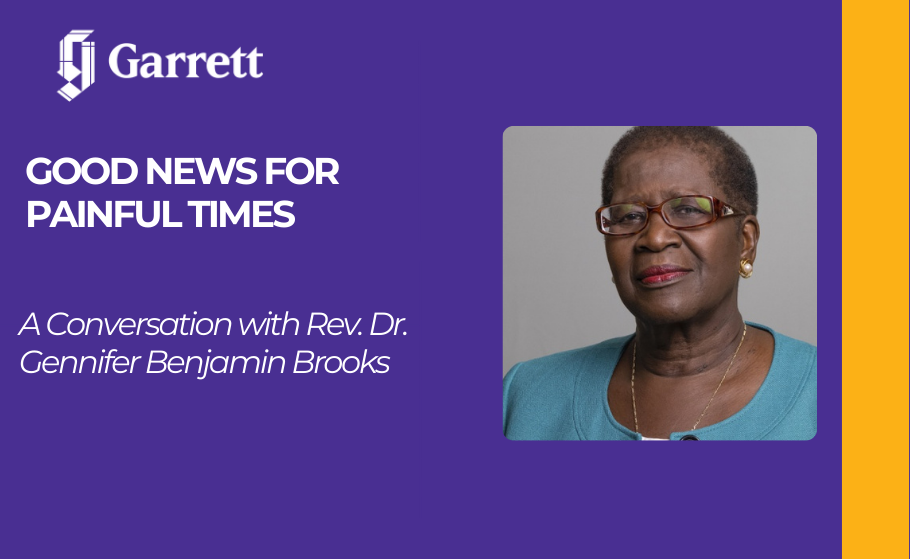Good News for Painful Times
January 17, 2025
A Conversation with Rev. Dr. Gennifer Benjamin Brooks

“Pastors shoulder a big burden, but guess what? That’s what you signed up for, baby.” Dr. Gennifer Benjamin Brooks offers a hearty laugh as she summarizes the task facing preachers as we enter a new year. “You said God called you into God’s work, so here you are.” Garrett’s Ernest and Bernice Styberg Professor of Preaching is quick to flash an infectious smile and peppers her advice with generous humor, but she is resolute about the crucial task that ministers carry into the pulpit. “We are responsible for opening our eyes to how God is acting, even in the midst of terrible situations; to preach a word that makes a difference in someone’s life. You must be serious about this thing you call a call.”
Her words are a hefty charge in the best of circumstances, but they carry particular weight when so many congregants are moving through existential and physical crises. Hopelessness, alienation, and loneliness are pervasive afflictions, not to mention deep-seated fears about what the coming years will bring. As we speak, fires are ravaging California, Appalachia still struggles to recover from devastating floods, wars continue without an end in sight, millions are threatened by a new administration’s promised policies, and the trauma of yet another event of mass murder in the midst of the holiday season still affects our nation as a whole. “We must start by saying: ‘Friends, this is where we are. Whatever your politics are, we are about to step off the abyss and we don’t know what’s on the other side,’” Dr. Brooks suggests. “And still, we preach the good news. Because good news is not necessarily happy, happy news—it’s about God’s active, transformative presence in human life.”
Part of Dr. Brooks’ prescription for prophetic ministry is to model a life of faith that’s comfortable being forthright with God about our suffering. “If we believe in a just God who loves peace and brings joy, where was God when that person was running people down in New Orleans? If I lost my child in that, I would be asking, ‘So where were you? Why weren’t you there to save my child?’” she offers. “I can fight with God because I have a great relationship with God. When you have a good relationship with someone, you can fight with them.” Her honesty is a refreshing balm for a world where too many people have internalized the notion that faith is synonymous with unquestioning belief, trading the way Jacob wrestled with the angel for the power of positive thinking. “God is inviting us to think deeply about this moment,” Dr. Brooks says, “to consider what it means to celebrate together, even those of us who are in the midst of pain.”
To pursue this shift, the Church must reorient how it understands itself in relationship to a wider culture. “Churches have forgotten that the person they are supposed to follow was someone who was born in a marginalized society, lived on the margins, worked on the margins, had an affinity for the margins,” Dr. Brooks says. “Somehow the established church has lost its relationship with the baby who was put in a feeding trough.” Recovering the Church’s true foundation often demands speaking uncomfortable truths, a muscle ministers must strengthen. “Sometimes, what happens with preachers is that they begin to swallow their own beliefs and shallowly breathe the air where they have been sent in order to hold on to their good paying job,” she cautions. “And yet you must also know how much you can be confrontational, not even to avoid losing your job but to enable people to hear what you’re trying to say.”
If all of this sounds like an imposing tight rope, that’s because it is. To sustain the effort required to walk it faithfully, Dr. Brooks advises preachers to root themselves in the same Spirit that called them to the task of ministry. “Before you seek to do this work to which you say God has called you, go back to God,” she says, voice rising in the cadence of an experienced preacher. “Go on your knees if you’re a knee pray-er. Listen for whatever it takes for you to know and feel that God is empowering you for God’s work.” That willingness to ask God for help connects ministers to the One whose voice we seek to channel and reminds us that we never enter the pulpit alone.
If all of this sounds like an imposing tight rope, that’s because it is. To sustain the effort required to walk it faithfully, Dr. Brooks advises preachers to root themselves in the same Spirit that called them to the task of ministry. “Before you seek to do this work to which you say God has called you, go back to God,” she says, voice rising in the cadence of an experienced preacher. “Go on your knees if you’re a knee pray-er. Listen for whatever it takes for you to know and feel that God is empowering you for God’s work.” That willingness to ask God for help connects ministers to the One whose voice we seek to channel and reminds us that we never enter the pulpit alone.
It also taps into a fundamental gratitude that transcends our present circumstances. “The fact that you’re alive—that alone is something to shout about,” Dr. Brooks proclaims with joy. “I may not feel as well as I would like to feel, but guess what? God let me live another day. And the fact that God gave you a day means God is with you, too. Grab it, hold onto it. The Spirit has a new thing to give you.”
To read more about Dr. Brooks’ advice for preaching, pick up a copy of Good News Preaching: Offering the Gospel in Every Sermon.

